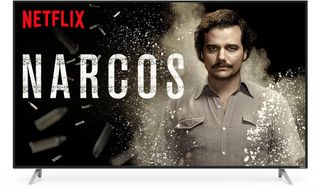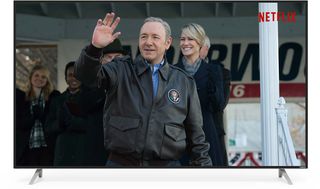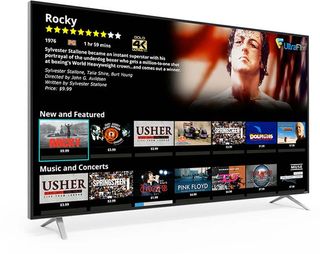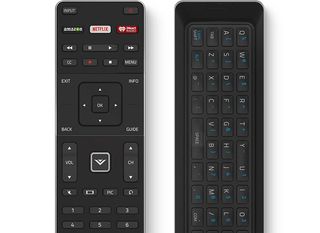Vizio M Series (M65-C1) Review: Great Big 4K Value
The Vizio M-Series’ full-array backlighting delivers a superb picture for 4K TV shoppers who want a large 65-inch set at an affordable price.
Why you can trust Tom's Guide

Vizio's TVs have established a reputation as upper-class performers at middle-class prices. The Vizio 65-inch M-Series 4K Ultra HD TV (3840 x 2160 pixels) continues that tradition, delivering a bright, boisterous picture that won't break your big picture budget.
Available for $1,500, Vizio's 65-inch M-Series model includes smart TV features, such as built-in apps for streaming services like Netflix, an advanced remote control with a built-in keyboard, and excellent contrast for revealing picture details in dark scenes. The superb contrast is due, at least in part, to this TV's full-array LED backlighting, which puts the lighting directly behind the screen (rather than along the edges) and divides the image into 32 separate zones so that it can enhance one area while simultaneously dimming another. It's an effective technique and technology that is often used in sets costing thousands more.
Design: Steady As She Goes
Resting on a pair of edge-mounted legs, the Vizio M65-C1 is steady on a tabletop, especially for such a large set. It's not too heavy, either, at a little more than 60 pounds, and 2.5 inches deep. The set includes the usual connections, including built-in Wi-Fi 802.11ac, which can take advantage of faster wireless speeds for owners who have a newer router at home.

There are five HDMI ports, although only three can handle copy-protected HDCP 2.2 material (high-bandwidth digital content protection), which can be confusing and frustrating when you're hooking up program sources. To round out the connectivity options, the set has Ethernet, composite and component video inputs, analog and digital audio outputs, and just one USB port.
Performance: Bold and Bright
As you'd probably expect, 4K content shines on this set. I saw every flyaway strand of hair and every vein in James Spader's bloodshot eyes. Colors are bright and bold; there's nothing subtle about the Vizio's picture. For all its image strengths, however, I found a compatibility problem with our test 4K player, the Sony 4K Ultra HD Media Player. The picture came through crystal clear, but the Vizio M-Series could not play the audio track on downloaded copy-protected content, rendering the television useless for anyone who is relying on the Sony machine to deliver ultra-HD 4K content.

A representative for Vizio said the company was not aware of any such problems and that the Vizio M-Series set meets all official ultra-HD specifications. However, the company is looking into the issue; Vizio also downloads regular software updates to its TVs, so it's possible that a fix is in the works.
The money you save on this set would be well put toward a good soundbar.
Viewing standard-HD material on the Vizio M65-C1 was a generally positive experience. The TV did a good job of upscaling material to 4K resolution, with only a few minor hiccups. In the best preset Calibrated mode, the Vizio M-Series demonstrated excellent detail in bright areas and in shadows. With letterboxed material, the top and bottom bars looked solid and black, while star-filled skies looked detailed without the video processing creating image artifacts like streaks in the Blu-ray edition of Gravity.

There wasn't any obvious haloing or light bleeding, although in some scenes, the software generated momentary blotchy pixelation when it had to display quick-moving dark scenes that contained bright clouds in the background. The same blotchy effect could be seen in the opening scene of the Blu-ray edition of Skyfall.
MORE: Best 4K TVs
Conversely, the Vizio M65-C1 did a top-notch job of rendering all of the rapidly moving elements in Bond chase scenes. And when, Sandra Bullock started spinning out into the void of space in Gravity, the Vizio M-Series' picture was virtually flawless. It also did an admirable job of yielding details in Mad Max: Fury Road, such as the windmills on top of the rock stanchions— details that simply aren't rendered well in standard-HD sets.
The Vizio M-Series' audio is one area where this TV falls flat. It sounds hollow and tinny, and there isn't much volume. The money you save on this set would be well put toward a good soundbar.
Interface: Old Graphics But Capable Remote
Vizio does support the requisite streaming music and video services, such as iHeartRadio and Netflix, as well as dozens of apps via the Yahoo Connected TV Store. You can flip through screens of tiled services or stick to frequently used apps, such as UltraFlix for 4K programs, along the bottom of the screen. The interface is a bit dull and slow, but it's straightforward. Compared to Android TV (on Sony sets) and webOS (on LG models), it could use a refresh, though.

To help maneuver through the streaming options, the included Vizio remote has a standard set of directional and numeric keys on one side, and a QWERTY keypad on the other. It's a design that keeps the remote control down to a small, manageable size, and the blacklight helps you find the right keys in the dark.
Bottom Line
At this price and performance mark, the Vizio 65-inch M-Series is destined to be a popular 4K ultra-HD set that appeals to a wide variety of shoppers. While it lacks some high-end features, such as support for the newest high dynamic range (HDR) content, it covers all the necessary 4K bases. (Vizio does offer HDR-compatible TVs in its Reference line, but the 65-inch HDR model is $6,000.) Furthermore, the Vizio M65-C1 offers such a detailed picture, with enviable contrast and deep blacks, that owners will have little reason to complain. We wish Vizio would update its smart TV interface, but overall, the M65-C1 is a fantastic value.
Sign up to get the BEST of Tom's Guide direct to your inbox.
Here at Tom’s Guide our expert editors are committed to bringing you the best news, reviews and guides to help you stay informed and ahead of the curve!
John R. Quain has been reviewing and testing video and audio equipment for more than 20 years. For Tom's Guide, he has reviewed televisions, HDTV antennas, electric bikes, electric cars, as well as other outdoor equipment. He is currently a contributor to The New York Times and the CBS News television program.
